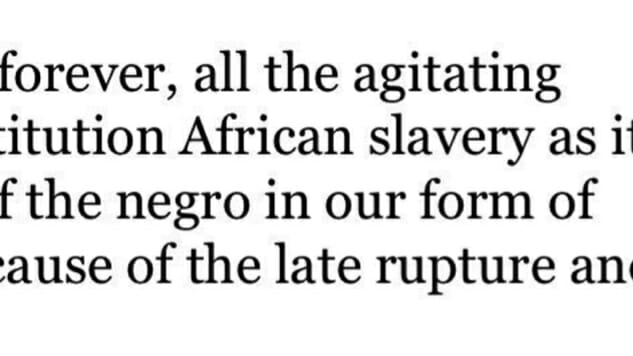The Next Time Someone Says the Civil War Wasn’t About Slavery, Show Them This
Photo via Twitter video
Earlier today, Donald Trump gave a very Donald Trump-esque interview about Andrew Jackson, which contained a potent mix of fact errors, historical ignorance, and some legitimately troubling viewpoints thrown in for good measure. WaPo has a solid round-up, but here’s the money quote:
I mean, had Andrew Jackson been a little later, you wouldn’t have had the Civil War. He was a very tough person, but he had a big heart. And he was really angry that — he saw what was happening with regard to the Civil War. He said, “There’s no reason for this.” People don’t realize, you know, the Civil War — if you think about it, why? People don’t ask that question, but why was there the Civil War? Why could that one not have been worked out?
Now, while Trump seems to understand that Jackson wasn’t actually president during the Civil War, he seems slightly confused about the timeline—Jackson died in 1845, 16 years before the war began, so he can’t have had very many strong opinions about the conflict. The second big issue is the idea that Jackson, who along with his “big heart” had an outsized capacity for cruelty, was a slave owner himself. Furthermore, he presided over the trail of tears, which shows that his sympathy for persecuted people was quite limited (ie, nonexistent). So if Jackson could have avoided the Civil War, it probably would have been because he defended the institution of slavery from the White House. And Trump’s assertion that the Civil War was avoidable seems to indicate that, at the very least, he would favored a gradual phasing out of slavery, as opposed to the outright abolition advocated by Lincoln. So, basically, the Emancipation Proclamation was not his cup of tea. Strong take, Donald!
As this interview has spread around the Internet, a series of tweets made a week ago by Harvard PhD candidate and poet Clint Smith III have been making the rounds. Those who think the Civil War could have been avoided—southerners, usually—tend to hold the opinion that the war was not, in fact, about slavery. You’ve probably heard this before: “It was about states’ rights!” The idea is that if the north had simply respected their autonomy, it wouldn’t have been such a big deal, and slavery would have eventually ended anyway. It’s a total dodge, born of the fact that certain people would rather ignore how the legacy of the American south is, in part, a legacy of human bondage, and that the institution of slavery had to be wrested from them with violence. It’s a “we’re not the bad guys!” argument, but, transparent revisionism though it may be, it’s also quite persistent in the discourse.
Smith has a different take. He did the legwork of actually looking up what the southern states said in their declarations of secession, and the words tell their own story. I’ll let Smith take it from here:
Strange that ppl still say the Civil War “wasn’t about slavery” when the declarations of Cofederate secession say “this is about slavery.”
— Clint Smith (@ClintSmithIII) April 25, 2017
This is what Louisiana said: pic.twitter.com/NA9i9M6yho
— Clint Smith (@ClintSmithIII) April 25, 2017
-

-

-

-

-

-

-

-

-

-

-

-

-

-

-

-

-

-

-

-

-

-

-

-

-

-

-

-

-

-

-

-

-

-

-

-

-

-

-

-








































